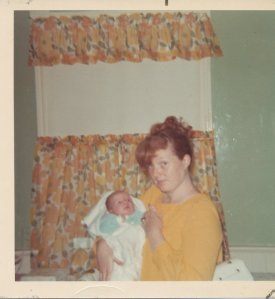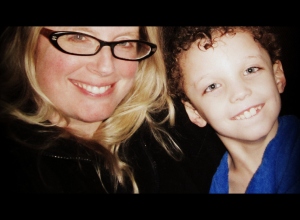 “Mom, tell me about your mother,” my seven-year-old son Edgar asked as he studiously manipulated the latest acquisition to his Beyblade collection.
“Mom, tell me about your mother,” my seven-year-old son Edgar asked as he studiously manipulated the latest acquisition to his Beyblade collection.
We were in the car, my eyes on the road, his on his toy when he posed not for the first time questions about my mother.
I hesitate telling my children too much, but I certainly need to tell them enough—not only to honor their earnest inquiries but also to ensure that the woman who raised me does not take on mythic status due to my reticence.
“What would you like to know?” I asked him.
“Well, tell me what was wrong with her brain.”
He knows that my mother had significant mental health issues, which, for his seven-year-old benefit we have always described in terms of her brain not being healthy and not allowing her to make the best decisions.
I then thought about the verbiage we have been using, terms we came up with well before Edgar was diagnosed with epilepsy or ADHD—conditions he understands to be the result of his brain working in a different capacity compared to others’—and I could see the connections he was making and where this conversation was going.
And I was terrified.
He said, “Mom, you didn’t really love your mother, did you?”
I told him my feelings for her were and are very, very complicated.
He surmised that since she hurt me it would make sense if I didn’t love her. Then he added, “But you know, Mom, I think I understand her . . . why she made bad decisions. Her brain didn’t help her—just like mine sometimes doesn’t.”
I reflected on his magnanimity, the depth of his understanding and empathy; but at the root of it I also understood his fear—that my love for my beautiful son may be compromised if one day his brain causes him to make a decision that hurts me.
 I explained about unconditional love, the love a parent has for a child, the love I have for him.
I explained about unconditional love, the love a parent has for a child, the love I have for him.
And that’s truly where I thought this chapter would end . . . a picture-perfect moment where I express and my son understands the depth of what I feel for him, a neat conclusion tied up with a bow.
But it didn’t end here–and there was most assuredly no bow.
He pursued and in rapid-fire succession asked if she had epilepsy. I told him she didn’t. He asked if she had ADHD. I said no. He then asked what she did have, and I told him. He asked me if she were born that way, how old she was when people realized her brain was not healthy.
He asked whether the same diagnosis was coming for him.
And before I could answer—as if I could answer—he mercifully asked, “Mom, what was her name again?”
I said, “Diane.”
He said, “That’s a pretty name. Maybe it’s not to you, but it is to me. I think it’s nice.”
I stared straight ahead at the road in front of me and realized that my past may be behind me—but it’s also on the side of me, above me, below me, and in front of me. And clearly it’s in my son’s heart and on his mind.
He doesn’t realize that her story will not be his story, and so he fears it—this sweet soul who carries burdens in body and mind disproportionate to his years.
I can’t change my past nor can I predict my son’s future. All I can do is negotiate the present and hope that there are enough hugs, enough declarations of love to make up for the rest.

Our pasts are history; we cannot change them; we can adjust to them; we can learn from them, and when the opportunity surfaces to imitate or obliterate the cycle, hopefully that choice is ours, and OH BOY, OH GIRL, can we do a number obliterating!!!
Peace,
Wow– you continue to amaze. Beautiful!